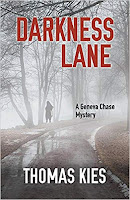The Genesis of a New Series
When your mentor and eventual friend is the celebrated Queen of Crime, P.D. James, her suggestion that your write a second series is one you don't ignore.
Studying Gothic Literature one summer at Oxford University, I
took the train to interview the Baroness for Mystery Review magazine. I was researching Oxford as the
setting for the first Nora Tierney English Mystery, The Blue Virgin, mostly written, when the octogenarian opened the
door to her Holland Square townhouse. Warm and funny, I was thrilled to even be
in the same room with my idol, much less in her home conducting an interview
and snapping photos of her signing my copy of her autobiography to accompany
the piece.
After an hour of answering my questions, James invited me to
have coffee in her downstairs kitchen (Nescafe’ instant accompanied by Walker’s
shortbread biscuits). That more casual conversation cemented what would be a
fifteen-year friendship until her death in 2014, with letters, emails, cards,
and tea time whenever I visited the UK for more setting research after that.
That day, James had me describe my plans for the English mystery
series, featuring an American writer who lives in England, while we sat at the
scrubbed pine table where I knew she often wrote her outlines and first drafts
in longhand. Then she asked about the various nursing positions I’d held before
turning to full-time writing. When I mentioned my years working as a medical
consultant for a New York television and movie studio, her face lit up and her
eyes glowed.
“Promise me one day you’ll write another series, one featuring a
nurse who has that job.” James insisted readers would enjoy a behind-the-scenes
look at a different world. I made that promise, and once I had The Green Remains and The Scarlet Wench in print in the Noras,
turned my hand to fulfilling it. The first Trudy Genova Manhattan
Mystery, Death Unscripted, is
dedicated to James, the woman who’d been instrumental in suggesting the series.
Alternating the two now, I’ve just brought out the second
Trudy. Death at the Dakota is
set in
Manhattan‘s iconic Victorian apartment building. Home to millionaires
and celebrities through the decades, famous tenants have included Lauren
Bacall, Judy Garland, Boris Karloff, Carly Simon, and Rudolf Nureyev. In modern
times its most famous resident, John Lennon, was murdered in its elaborate entryway
in 1980. The Dakota’s board is notorious for those applicants it’s denied, too,
who include Billy Joel, Cher, and Madonna. Yoko Ono still lives there, as does
film critic Rex Reed.
When I was given the floor plan of the apartment that had once
been home to Leonard Bernstein and his family, I knew Trudy would work on a TV
movie filming at the storied building. In reality, the building only allows
filming of its exterior —the supposed interiors used in films like Rosemary’s Baby were all soundstage
replicas—but in Trudy’s world anything is possible.
Trudy’s assignment is to protect the film’s star, Monica Kiley,
in the early stages of a dicey pregnancy. When Monica goes missing and another
cast member dies, Trudy’s nose for murder finds her in the thick of things. At
the same time, her NYPD detective boyfriend, Ned O’Malley, is involved in a
murder investigation where the victim has been burned beyond recognition. Two
victims and two killers challenge Trudy and Ned, when their cases cross paths in
this mix of amateur sleuth and police procedural one reviewer has called “the
new Nick and Nora.”














